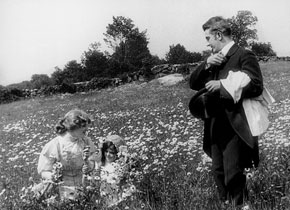
Griffith Kurzfilme
The Country Doctor (1909) von D. W. Griffith. s/w, ca. 16 min Lines of White on a Sullen Sea (1909) von D. W. Griffith. s/w, ca. 16 min The Unchanging Sea (1910) von D. W. Griffith. s/w, ca. 16 min The Sands of Dee (1912) von D. W. Griffith. s/w, ca. 17 min The Man That Might Have Been (1914) von William Humphrey. s/w, ca. 17 min Griffiths Leben als Künstler begann am Theater, wo er sich ein Jahrzehnt lang als Schauspieler und Dramatiker durchschlug. Seine erste Veröffentlichung war ein Gedicht („The Wild Duck“, 1907), und die Dichtkunst wurde sein Maßstab für das perfekte kinematografische Werk (die Kunst, „den Wind zu filmen“). Viele seiner besten Filme spiegeln dieses Ideal wider - dank purer Inspiration (wie im erstaunlichen Anfangs- und Schlussbild von The Country Doctor) oder in direkter Bezugnahme auf literarische Quellen, z. B. von William Carleton (Lines of White on a Sullen Sea) oder Charles Kingsley (The Unchanging Sea und, atemberaubend, The Sands of Dee). Kaum einer seiner Kollegen konnte sich mit Griffiths Gespür für die „Metrik“ der Montage und des Erzähltempos messen; eine brillante Ausnahme bildet William Humphreys The Man That Might Have Been, ein klagender Gesang über Erinnerung und Reue. (PCU) Am Klavier: Gerhard Gruber
Griffith’s life as an artist began in the theatre, where he spent a decade trying to earn a living as an actor and playwright. But his first published work is a poem (“The Wild Duck”, 1907), and poetry was Griffith’s benchmark for the perfect cinematic work (something he liked to compare to “filming the wind”, as he once declared). Many of his best films reflect this ideal, either by sheer inspiration (in the astonishing first and last shot of The Country Doctor) or by direct quotation from literary sources (William Carleton in Lines of White on a Sullen Sea, Charles Kingsley in The Unchanging Sea and the breathtaking The Sands of Dee). Few competitors ever managed to match Griffith’s feeling for the “metrics” of editing and narrative pace; a brilliant exception is provided by The Man He Might Have Been (William Humphrey, Vitagraph), a plaintive chant of memory and regret. (PCU)